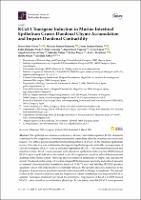Please use this identifier to cite or link to this item:
https://repositorio.usj.es/handle/123456789/291
| Title: | KCa3.1 Transgene Induction in Murine Intestinal Epithelium Causes Duodenal Chyme Accumulation and Impairs Duodenal Contractility |
| Authors: | Valero Gracia, Marta Sofía



Ramón-Giménez, Mariano 

Lozano-Gerona, Javier 

Delgado-Wicke, Pablo 

Calmarza, Pilar 
Olivan-Viguera, Aida 

López Ramos, Víctor 

García-Otín, Ángel Luis 


Valero, Salvador Pueyo, Esther 


Hamilton, Kirk L 
Miura, Hiroto 
Köhler, Ralf 

|
| Keywords: | Intermediate-conductance calcium-activated potassium channel; KCa3.1; Epithelium; Duodenum; Contractility; Transgenic mice |
| Issue Date: | 8-Mar-2019 |
| Citation: | Valero, M.S.; Ramón-Gimenez, M.; Lozano-Gerona, J.; Delgado-Wicke, P.; Calmarza, P.; Oliván-Viguera, A.; López, V.; Garcia-Otín, Á.-L.; Valero, S.; Pueyo, E.; Hamilton, K.L.; Miura, H.; Köhler, R. KCa3.1 Transgene Induction in Murine Intestinal Epithelium Causes Duodenal Chyme Accumulation and Impairs Duodenal Contractility. Int. J. Mol. Sci. 2019, 20, 1193. |
| Abstract: | The epithelial intermediate-conductance calcium/calmodulin-regulated KCa3.1 channel is considered to be a regulator of intestine function by controlling chloride secretion and water/salt balance. Yet, little is known about the functional importance of KCa3.1 in the intestinal epithelium in vivo. Our objective was to determine the impact of epithelial-specific inducible overexpression of a KCa3.1 transgene (KCa3.1+) and of inducible suppression (KCa3.1-) on intestinal homeostasis and function in mice. KCa3.1 overexpression in the duodenal epithelium of doxycycline (DOX)-treated KCa3.1+ mice was 40-fold above the control levels. Overexpression caused an inflated duodenum and doubling of the chyme content. Histology showed conserved architecture of crypts, villi, and smooth muscle. Unaltered proliferating cell nuclear antigen (PCNA) immune reactivity and reduced amounts of terminal deoxynucleotide transferase mediated X-dUTP nick end labeling (TUNEL)-positive apoptotic cells in villi indicated lower epithelial turnover. Myography showed a reduction in the frequency of spontaneous propulsive muscle contractions with no change in amplitude. The amount of stool in the colon was increased and the frequency of colonic contractions was reduced in KCa3.1+ animals. Senicapoc treatment prevented the phenotype. Suppression of KCa3.1 in DOX-treated KCa3.1- mice caused no overt intestinal phenotype. In conclusion, inducible KCa3.1 overexpression alters intestinal functions by increasing the chyme content and reducing spontaneous contractions and epithelial apoptosis. Induction of epithelial KCa3.1 can play a mechanistic role in the process of adaptation of the intestine. |
| URI: | https://repositorio.usj.es/handle/123456789/291 |
| ISSN: | 1422-0067 |
| Appears in Collections: | Artículos de revistas |
Files in This Item:
| File | Description | Size | Format | |
|---|---|---|---|---|
| ijms-20-01193-v4.pdf | 5,33 MB | Adobe PDF |  View/Open |
This item is licensed under a Creative Commons License

